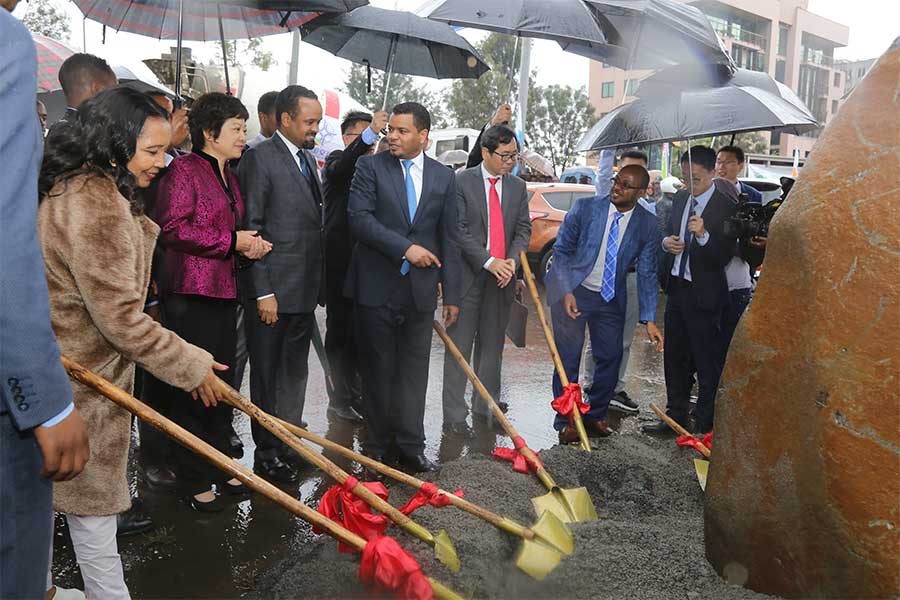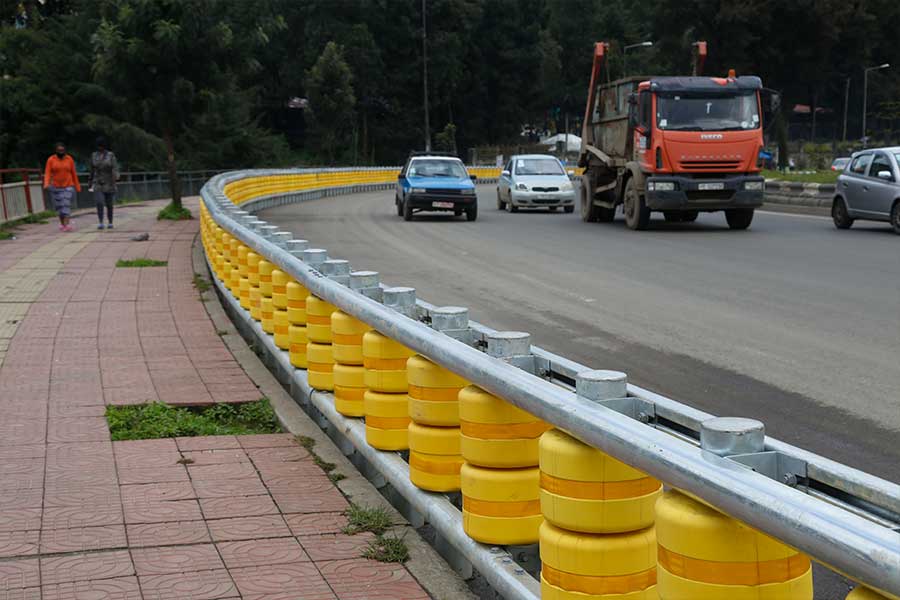
Radar | Jan 04,2020
Oct 3 , 2020
By Ayele Tirfie Woldemichael
The historical evidence for SMEs as a means for progressive advancement of industrialisation and development is one of success. Setting the necessary conditions for their development is incumbent upon government, writes Ayele Tirfie Woldemichael, author of several books and alumni of Oregon State University and the University of Stuttgart.
Many developed and advanced developing nations made and still continue to make vital decisions about taking the small and medium-sized enterprise (SME) route as their pathways to industrialisation. What makes the route monumental is that the SME option for industrialisation not only historically hastened the process but also still continues to support the progressive advance of the industrial status of advanced nations such as Japan, Germany and the United States.
Drawing lessons from those at the top end of industrialisation, advanced developing countries like India, Brazil, Thailand and even China have followed the same route - adjusted, of course, to their own social and economic conditions - with fulfilling results. A compelling move to the SME way needs to be viewed in this proven context of success.
What are the distinguishing characteristics of SMEs that render them singular as an option for industrialisation?
There are some factors, including accelerating industrial growth and development; capacity for increased employment creation; affordability in terms of capital requirements; demand for skills; and amenability to spatial or geographical decentralisation. Just as important is greater responsiveness to incentives; being mostly resource-based and basic needs-oriented; capability to serve as instruments for broader income distribution; and modest business size with latent potential to grow bigger.
SMEs are also optimal for developing entrepreneurial talents and serve as instruments for the wider inter-regional exchange of goods and services with less complex logistical and infrastructure requirements. They entail high potential to be markets for and suppliers of inputs for more established or large-scale businesses, the flexibility of capacity to produce increased diversities of goods and services, and boost the capacity to stem massive migration of people to major cities
This will not happen in a vacuum, nonetheless. There are essential conditions necessary to strengthen their development and effectiveness. They are a proper route to industrialisation, because they effectively propel development and still continue to do so in the advanced and advancing economies. But it is also because many developing nations in Africa and elsewhere are blessed with hard and soft resource potentials as a precondition.
The diversity of their rich natural resources bears the hallmarks of a fulfilling base and portends well for advancing the promotion of SMEs with broad-based and significant development effects. But there are fundamental and unchallengeable conditions to be satisfied for SMEs to sustainably bring development.
One of the most important steps would be a purpose-built institute to be charged with the vital responsibility of overseeing the growth, spatial spread, diversification and development of SMEs.
More concretely, the institute’s mandate would need to include some functional roles. It would need to represent SMEs at national and regional level forums for planning and budgetary provision and oversee the start-up, growth, diversification and expansion of SMEs.
It would also need to mobilise resources from public and private sources for start-ups and ongoing SMEs, as well as monitor and evaluate the efficiency and effectiveness of their utilisation and in the maintenance of quality in the production of goods and services.
Such an institute would also be tasked with organising training in managerial skills, financial management, bookkeeping and material management. Closely related to this would be assisting in identifying areas of production with backward and forward linkages and overseeing inter-sectoral coordination for promoting SMEs.
No less important a task for such an institute is conducting research and development in the areas of market opportunity, product design, innovation and development as well as in systems design. Assisting in setting up quality control systems for products and in establishing efficient process design and plant layout will also help the SMEs achieve their dreams.
Organising exposure visits to other countries or external institutions for experiential gains, organising trade fairs for SME products and building up the database of external suppliers of inputs, including technologies, should be another task for the institute.
Another critical condition is a resource-based form of industrialisation. The principle, which is sacrosanct for developing nations especially in Africa, is changing the countries' economies from the ongoing state of being producers and exporters of primary commodities to producers of processed, value-added and final-use products.
There are certain retarding features that characterise the production and export of raw resources. This can be in how income is generated to subsequently be used to pay for the import of final consumer goods and “capital equipment” as well as partially processed goods primarily for extracting raw resources. It can also be evident in the lack of a possibility for diversification and linkages with the rest of the economy.
Economies characterised by their dependence on the export of raw materials also have almost non-existent backward and forward linkages for multiple employment and income-generating opportunities. They are just as well limited in terms of employment creation and development effects.
The export of raw resources entails the creation of jobs and income in the importing countries, which for the exporting nations virtually means losing the said jobs and incomes. This process is considered a form of de-industrialisation, according to a 2013 paper by the Economic Commission for Africa (ECA), which sees it as a "critical cause" of weak industrial development.
The antithesis of the ill-advised export of rich and diverse resources is the resource-based industrialisation or SME promotion which not only retains jobs and incomes but also broadens the opportunities for creating more of them. In particular, the paradigm shift to resource-based industrialisation brings provable benefits to a nation’s continued growth and development efforts.
Every industrial entity or SME, supported by natural resources behind it, creates multiple backward, forward and horizontal linkages, thereby generating expanded opportunities for jobs and incomes on a sustained basis. The establishment of resource-backed industrial SMEs sets conditions for input supplies behind them (backward linkages) to increase in quantity and quality. They, in turn, generate inputs for other SMEs to take them for further processing, and that signifies forward linkages. Phenomenal in this whole process is also the provision of services at every stage. This exemplifies expanded and diversified opportunities stemming from SMEs.
Effective utilisation of investment resources in industrial promotion also occurs when SMEs, based on the input resources, generate multifaceted returns including jobs, incomes for employees and profit for enterprises on a sustained basis. Here, the prime objective of maximised benefits over generated costs in the process is derived from the investment. The ratio is maximised. Finally, the fiscal linkage is created here when the government receives tax revenues from thriving SMEs.
The productive utilisation of people’s capacity finds meaningful expression and the participation of communities will be rooted in the inputs they provide and in the end products they consume. The spatial spread or diffusion of development effects across a nation becomes rooted in the resource possibilities of geographical areas and in the entrepreneurial talents of SME promoters to utilise them.
Depending on the diversity of resource endowments between regions, region-based specialisation in product types can also be vital outcomes for mutually rewarding inter-regional exchanges of goods and services.
Necessarily, there need to be conditions that are basic and take centre stage for the preceding benefits to occur in the process of promoting resource-supported SMEs.
Critical among these is the acquisition of appropriate technology, which ought to be at best preceded and at worst coupled with the development of knowledge and skill capacities. The principles of increased technology productivity and technology maintenance demand for the said capacities to exist. Intensive and extensive vocational quality-based training is one route that can be expedited.
Value chain analysis, spearheaded by institutionalised supports to SMEs, takes priority. The underlying significance of this is hinged on augmenting production efficiency and effectiveness by enhancing values created and minimising costs generated in the process of producing final outputs. That constitutes the very foundation of market competitiveness both domestically and externally.
Unrelenting drive for the formation of SME clusters is without choice to gain collective strength and financial capacity for input acquisition, cost-sharing, experiential exchanges and organised voice.
The issues of promoting import-substituting products by SMEs and effecting infant industry protection are commonly shared views and soundly gainful for aspiring SMEs. The clarion call here is to make such SMEs efficient, effective and competitive to penetrate markets and retain them. The choice cannot be protecting inefficiency or substituting import by-products of lower use-value or quality.
The issues discussed above regarding developed human capacity as a force for increased factor productivity, adaption and productive use of technology and regular conduct of value chain analysis for process efficiency and high-value outputs take precedence.
Last but not least is instituting industrial policies of two types to influence the desired direction of SMEs and their contributions to development to increase.
One line of policy should focus on enforcing the vital concept and practice of adding value to the raw resources of nations, supported by technological inputs and entrepreneurial talents. Another policy measure should target sectors and agencies, supporting the initiation or start-up of SMEs, to commit themselves to coordinated, complementary and collective drive for cost-effective promotion of the SMEs.
It is justifiable to state that the historical evidence of SMEs as a means for progressive advancement of industrialisation and development is one of success. Necessary conditions for success to take place have always been and will continue to be the presence of entrepreneurial capacity, productive use of the right technologies, use of indigenous resources, availability of supportive infrastructure, enabling services of public institutions and competitiveness in price, quality, quantity and delivery.
The imperative for SME promoters and supporting agencies ought to be to make good on these cardinal prerequisites for success.
PUBLISHED ON
Oct 03,2020 [ VOL
21 , NO
1066]


Radar | Jan 04,2020

Commentaries | Dec 26,2020

Commentaries | Apr 11,2020

Fortune News | Oct 05,2019

Fortune News | Sep 03,2022

Agenda | Mar 30,2024

Radar | Nov 11,2023

Fortune News | Aug 16,2020

Radar | Mar 06,2021

Fortune News | Dec 05,2020

Photo Gallery | 175305 Views | May 06,2019

Photo Gallery | 165530 Views | Apr 26,2019

Photo Gallery | 155848 Views | Oct 06,2021

My Opinion | 136801 Views | Aug 14,2021

Dec 22 , 2024 . By TIZITA SHEWAFERAW
Charged with transforming colossal state-owned enterprises into modern and competitiv...

Aug 18 , 2024 . By AKSAH ITALO
Although predictable Yonas Zerihun's job in the ride-hailing service is not immune to...

Jul 28 , 2024 . By TIZITA SHEWAFERAW
Unhabitual, perhaps too many, Samuel Gebreyohannes, 38, used to occasionally enjoy a couple of beers at breakfast. However, he recently swit...

Jul 13 , 2024 . By AKSAH ITALO
Investors who rely on tractors, trucks, and field vehicles for commuting, transporting commodities, and f...

Oct 18 , 2025
The political establishment, notably the ruling party and its top brass, has become p...

Oct 11 , 2025
Ladislas Farago, a roving Associated Press (AP) correspondent, arrived in Ethiopia in...

Oct 4 , 2025
Eyob Tekalegn (PhD) had been in the Governor's chair for only weeks when, on Septembe...

Sep 27 , 2025
Four years into an experiment with “shock therapy” in education, the national moo...

Oct 18 , 2025 . By NAHOM AYELE
In a sweeping reform that upends nearly a decade of uniform health insurance contribu...

Oct 18 , 2025 . By BEZAWIT HULUAGER
A bill that could transform the nutritional state sits in a limbo, even as the countr...

Oct 18 , 2025 . By SURAFEL MULUGETA
A long-planned directive to curb carbon emissions from fossil-fuel-powered vehicles h...

Oct 18 , 2025 . By BEZAWIT HULUAGER
Transaction advisors working with companies that hold over a quarter of a billion Bir...